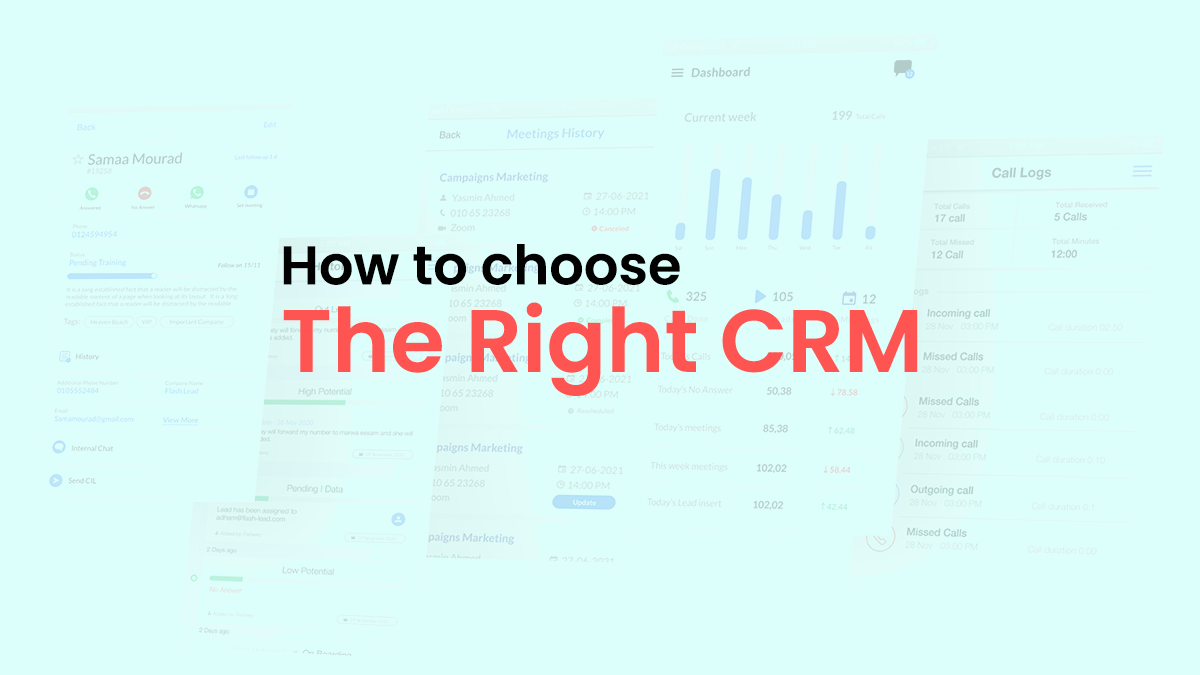How to Choose the Right CRM System for Your Small Business
Choosing the right Customer Relationship Management (CRM) system is a critical decision for small businesses aiming to streamline operations, enhance customer relationships, and drive growth. With a plethora of CRM solutions available, each offering unique features and benefits, it's essential to approach the selection process strategically. This guide outlines key factors to consider and steps to take when evaluating CRM systems tailored to the specific needs of small businesses.
Understanding the Importance of CRM for Small Businesses
CRM systems serve as central repositories for customer information, enabling businesses to manage interactions, track sales activities, and analyze data effectively. For small businesses, CRM goes beyond basic contact management—it's a tool for nurturing leads, improving customer service, and fostering long-term loyalty. By consolidating customer data and automating processes, CRM systems empower small businesses to compete with larger enterprises on customer experience and operational efficiency.
Steps to Choosing the Right CRM System
1. Assess Your Business Needs and Goals
Start by identifying your specific business requirements and goals. Consider what functionalities are essential for your operations—such as lead management, sales forecasting, customer support, marketing automation, or analytics. Understanding your priorities will guide you in selecting a CRM system that aligns with your objectives.
2. Determine Your Budget
Define a budget that accounts for both initial setup costs and ongoing subscription fees or maintenance expenses. Evaluate the return on investment (ROI) potential of different CRM solutions based on their features, scalability, and pricing models. Many CRM providers offer tiered pricing plans tailored to the needs of small businesses, providing flexibility in cost management.
3. Evaluate Ease of Use and User Interface
User adoption is crucial for CRM success. Look for a system with an intuitive user interface (UI) and easy navigation. Consider how easily your team members can learn and use the CRM software without extensive training. A user-friendly CRM system increases productivity and reduces the learning curve, ensuring rapid implementation and adoption across your organization.
4. Consider Integration Capabilities
Assess the CRM system's compatibility with other tools and applications your business uses, such as email marketing platforms, accounting software, e-commerce platforms, or project management tools. Seamless integration enables data synchronization across systems, eliminating manual data entry and enhancing operational efficiency.
5. Scalability and Customization Options
Choose a CRM system that can scale alongside your business growth. Consider whether the CRM offers customization options to tailor workflows, fields, and reports to your specific business processes. Scalable CRM solutions accommodate increasing data volumes, user additions, and evolving business needs without compromising performance or functionality.
6. Security and Data Privacy
Protecting customer data is paramount. Evaluate the CRM provider's security measures, data encryption standards, and compliance certifications (e.g., GDPR, HIPAA) to ensure regulatory compliance and safeguard sensitive information. Choose a CRM system with robust security features and regular updates to mitigate cybersecurity risks.
7. Seek User Reviews and Recommendations
Research customer reviews, testimonials, and case studies to gain insights into the CRM system's performance, reliability, and customer support. Platforms like G2, Capterra, and TrustRadius provide user-generated reviews that can offer valuable perspectives from businesses similar to yours.
8. Explore Customer Support and Training
Assess the CRM provider's customer support options, including availability, response times, and support channels (e.g., phone, email, live chat). Look for providers that offer comprehensive onboarding assistance, training resources, and ongoing technical support to help your team maximize the CRM's capabilities.
Choosing the right CRM system for your small business requires careful consideration of your unique needs, budget constraints, and growth objectives. By prioritizing functionalities, usability, integration capabilities, scalability, security, and customer support, you can identify a CRM solution that enhances efficiency, optimizes customer relationships, and drives sustainable business growth. Remember, the right CRM system is not just a tool—it's a strategic investment that empowers your small business to thrive in today's competitive marketplace.
Case Studies and Examples
Example 1: E-commerce Startup
A small e-commerce startup selects a cloud-based CRM system with robust marketing automation features. By integrating the CRM with their online store and email marketing platform, they streamline lead generation, personalize marketing campaigns, and track customer interactions. As a result, they achieve a 30% increase in customer retention and a 20% improvement in sales conversion rates.
Example 2: Consulting Firm
A boutique consulting firm chooses a CRM system with customizable project management modules and integration capabilities with their accounting software. This allows them to centralize client communications, automate billing processes, and analyze project profitability. They reduce administrative overhead by 25% and enhance client satisfaction through timely project delivery and proactive communication.
Future Trends and Innovations
Looking ahead, advancements in AI-driven analytics, mobile CRM solutions, and predictive modeling will continue to shape the CRM landscape for small businesses. Leveraging these technologies can further optimize customer engagement, improve decision-making, and drive competitive advantage.
Selecting the right CRM system is a pivotal decision that can propel your small business towards success. By following a structured evaluation process and leveraging insights from industry experts and user feedback, you can confidently choose a CRM solution that aligns with your business goals and empowers you to deliver exceptional customer experiences. Embrace CRM as a strategic asset and catalyst for growth, positioning your small business for long-term prosperity in an increasingly digital and customer-centric marketplace.






































